Comprehensive Guide to Garden Maintenance in Hampstead
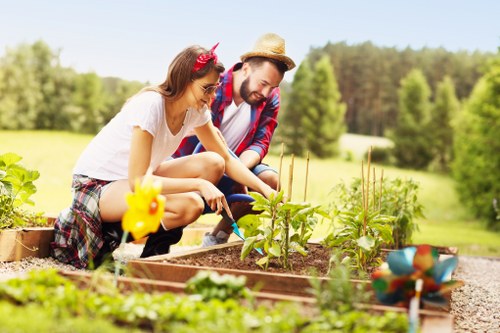
Introduction to Garden Maintenance in Hampstead
Maintaining a beautiful garden in Hampstead requires dedication, knowledge, and the right approach to tackle the unique challenges posed by the local climate and soil conditions. Whether you're a seasoned gardener or a novice, understanding the essentials of garden maintenance can transform your outdoor space into a serene oasis.
Hampstead, known for its charming streets and lush greenery, offers a perfect backdrop for gardening enthusiasts. However, the Anglo-Saxon weather patterns demand a tailored maintenance plan to ensure your garden thrives all year round.
This article delves into the essential aspects of garden maintenance in Hampstead, providing actionable tips and strategies to keep your garden vibrant and healthy.
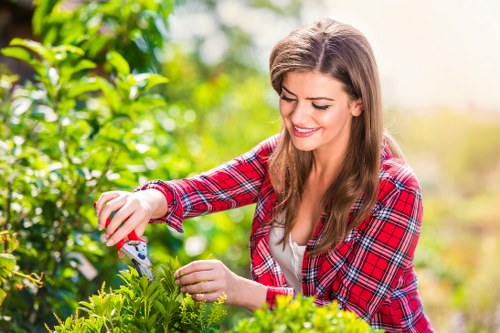
Planning Your Garden Maintenance Schedule
Effective garden maintenance begins with a well-structured schedule. Planning helps in allocating tasks throughout the year, ensuring that no critical maintenance activities are overlooked.
Seasonal Tasks
- Spring: Focus on soil preparation, planting new seeds, and pruning.
- Summer: Prioritize watering, weeding, and pest control.
- Autumn: Prepare plants for winter, mulch beds, and clean up debris.
- Winter: Protect sensitive plants, plan for the next season, and perform tool maintenance.
Adhering to a seasonal maintenance schedule ensures that your garden remains in optimal condition, regardless of the time of year.
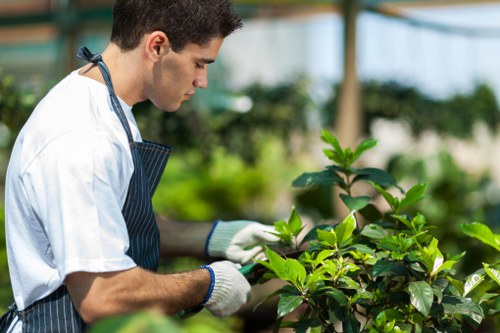
Soil Management
Healthy soil is the foundation of a thriving garden. In Hampstead, the soil composition can vary, so it's crucial to test and amend it as necessary to meet the needs of your plants.
Soil Testing
Conduct regular soil tests to determine pH levels, nutrient content, and texture. This information guides you in making informed decisions about soil amendments.
Amending Soil
- Add compost to improve soil structure and fertility.
- Incorporate organic matter to enhance moisture retention.
- Use lime or sulfur to adjust pH levels based on test results.
Proper soil management not only promotes plant health but also reduces the need for chemical fertilizers.
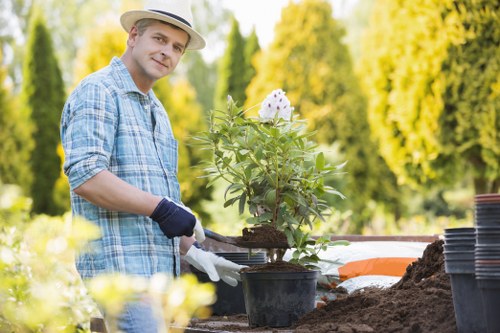
Plant Selection and Care
Choosing the right plants is essential for a low-maintenance garden. Opt for species that thrive in Hampstead’s climate and soil conditions.
Native Plants
Native plants are adapted to the local environment, making them more resilient and easier to care for. They also support local wildlife and biodiversity.
Recommended Native Plants:
- Lavender
- Roses
- Hydrangeas
- Hostas
- Camellias
Incorporating native plants into your garden design ensures sustainability and reduces maintenance efforts.
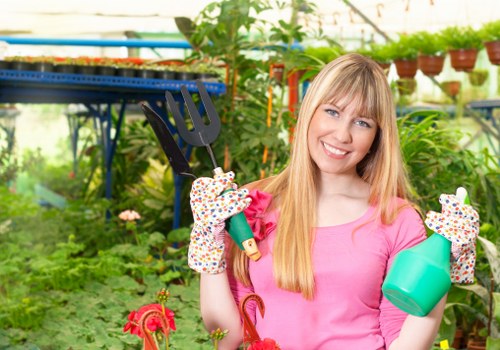
Watering and Irrigation
Proper watering techniques are vital for garden health. Overwatering or underwatering can lead to plant stress and disease.
Irrigation Systems
Installing an efficient irrigation system can save time and water. Drip irrigation and soaker hoses deliver water directly to the plant roots, minimizing evaporation and runoff.
Water Conservation Tips
- Water early in the morning to reduce evaporation.
- Use mulch to retain soil moisture.
- Collect rainwater for garden use.
Implementing water conservation strategies not only benefits your plants but also contributes to environmental sustainability.
Pest and Disease Management
Effective pest and disease management is crucial for maintaining a healthy garden. Early detection and natural remedies can prevent major infestations.
Identification
Regularly inspect plants for signs of pests or diseases. Recognize common indicators such as discolored leaves, wilting, or unusual growth patterns.
Natural Remedies
- Introduce beneficial insects like ladybugs and lacewings.
- Use neem oil or insecticidal soap for pest control.
- Promote plant diversity to reduce disease spread.
Adopting integrated pest management practices ensures a balanced and healthy garden ecosystem.
Pruning and Trimming
Regular pruning and trimming keep plants healthy and aesthetically pleasing. Proper techniques can enhance growth and prevent disease.
When to Prune
Different plants require pruning at specific times. For instance, spring-flowering shrubs are best pruned after they bloom, while others may need trimming in late winter.
Pruning Techniques
- Use sharp, clean tools to make precise cuts.
- Remove dead or diseased branches first.
- Thin out crowded areas to improve air circulation.
Mastering pruning techniques can significantly improve the health and appearance of your garden plants.
Weed Control
Weeds compete with your garden plants for nutrients and water. Effective weed control is essential for maintaining a robust garden.
Manual Weeding
Regular hand-weeding is the most straightforward method. It's effective for small gardens and allows precise removal without harming desirable plants.
Mulching
- Apply organic mulch like wood chips or straw to suppress weed growth.
- Replenish mulch annually to maintain its effectiveness.
- Ensure mulch is spread evenly around plants.
Combining manual weeding with mulching provides a comprehensive approach to weed management.
Lawn Care
A well-maintained lawn adds significant value and beauty to your garden. Proper lawn care involves mowing, fertilizing, and aerating.
Mowing Techniques
Maintain the correct mowing height for your grass type to promote healthy growth. Avoid cutting more than one-third of the grass height at a time.
Fertilizing
- Apply a balanced fertilizer in the spring and autumn.
- Choose organic fertilizers for a sustainable approach.
- Avoid over-fertilizing, which can harm the grass and the environment.
Regular mowing and fertilizing ensure a dense, green, and resilient lawn.
Garden Tools and Equipment
Having the right tools is essential for efficient garden maintenance. Invest in high-quality equipment to make tasks easier and more effective.
Essential Tools
- Pruning shears
- Garden fork
- Rake
- Hose with adjustable nozzle
- Lawn mower
Tool Maintenance
Regularly clean and sharpen your tools to extend their lifespan and ensure optimal performance.
Proper maintenance of garden tools not only saves money but also enhances your gardening experience.
Seasonal Garden Decor
Incorporating seasonal decor can enhance the aesthetic appeal of your garden. Thoughtful additions reflect the changing seasons and add character to your outdoor space.
Spring Enhancements
Introduce colorful flowers, garden statues, and ornamental lighting to celebrate the arrival of spring.
Autumn Accents
- Pumpkins and gourds
- Harvest-themed decorations
- Warm-toned lighting
Seasonal decor not only beautifies your garden but also creates a dynamic and inviting environment.
Sustainable Gardening Practices
Embracing sustainable practices contributes to environmental preservation and promotes a healthy garden ecosystem.
Composting
Composting kitchen scraps and garden waste reduces landfill usage and enriches your soil with organic matter.
Rainwater Harvesting
- Install rain barrels to collect runoff.
- Use harvested water for irrigation.
- Reduce dependence on municipal water sources.
Sustainable gardening not only benefits the environment but also reduces maintenance costs.
Professional Garden Maintenance Services
While DIY maintenance is rewarding, professional garden services can offer expertise and save time, especially for larger or more complex gardens.
Benefits of Hiring Professionals
- Expert knowledge of plant care and landscape design.
- Access to specialized tools and equipment.
- Time-saving and convenient.
Choosing the Right Service
When selecting a garden maintenance service in Hampstead, consider their experience, customer reviews, and range of services offered.
Contact us today to discover how our professional garden maintenance services can transform your Hampstead garden into a lush, vibrant space.